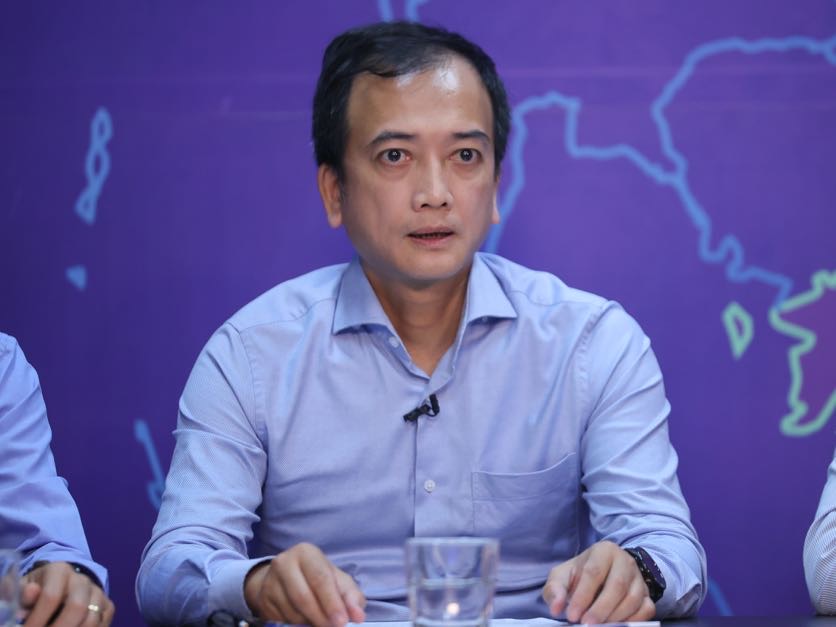The Ministry of Industry and Trade is proposing amendments to Decree 72 to allow Vietnam Electricity (EVN) to account for and allocate nearly 44.8 trillion VND in uncompensated production and supply costs from 2022 into retail electricity prices. This figure does not include the 21.8 trillion VND exchange rate loss from 2019 that EVN owes to power generation units under purchase agreements.
In the draft proposal to the government, the Ministry of Industry and Trade stated that electricity prices could remain unchanged or only increase by about 2-5% this year if this mechanism is implemented. However, this increase is not enough to cover all outstanding, unaccounted-for costs of EVN.
Trinh Quoc Vu, Deputy Director of the Electricity Regulatory Authority (Ministry of Industry and Trade), told VnExpress that if electricity prices are adjusted in October with an increase of about 3%, EVN would gain about 4.8 trillion VND in revenue.
Therefore, with the corporation's large "deficit" of nearly 44.8 trillion VND, he stated, "when this will be fully compensated is a difficult question." This depends on EVN's future financial situation, and the government must consider electricity price adjustments to minimize the impact on the macroeconomy and support various industries.
If the corporation makes a profit in the coming years, the accumulated loss will decrease correspondingly, reducing the pressure to adjust electricity prices. For example, in 2024, EVN returned to profitability, reducing their accumulated loss from over 50 trillion VND to nearly 44.8 trillion VND.
Favorable weather conditions, such as a cool first quarter, can also help. For instance, in the first quarter of this year, commercial electricity output only increased by about 4.43% compared to the same period last year. According to Vu, this resulted in a better financial outlook for EVN, potentially allowing them to "reduce a portion of the accumulated losses and pay the exchange rate difference."
 |
Trinh Quoc Vu, Deputy Director of the Electricity Regulatory Authority (Ministry of Industry and Trade), at a seminar, 10/9. Photo: VGP |
Trinh Quoc Vu, Deputy Director of the Electricity Regulatory Authority (Ministry of Industry and Trade), at a seminar, 10/9. Photo: VGP
Electricity is a unique commodity with simultaneous production and consumption, making storage impossible. Its cost depends heavily on input fuel prices (coal, gas), while retail prices are controlled and regulated by the government. However, it is also an essential commodity used extensively in production and business, so price increases affect daily life and the macroeconomy.
Many experts believe that electricity price adjustments should follow a suitable, predictable roadmap so that businesses and people know how long the process will take. Management also needs to be flexible, meaning electricity prices can increase or decrease if EVN's business situation improves.
The Deputy Director of the Electricity Regulatory Authority stated that the fundamental principle is that all costs comprising the electricity price must be accurately and fully calculated into the retail price. The government has delegated the management and operation of this commodity to the Ministry of Industry and Trade. However, he acknowledged that electricity is a special and essential commodity, and any increase or decrease affects everyone.
If the mechanism to compensate for EVN's losses through electricity prices is approved, Vu explained that the corporation must report the adjustment plan to the Ministry of Industry and Trade. The Ministry can then consult with the Ministry of Finance, and in some cases, report to the Prime Minister to establish a suitable roadmap.
The government also has mechanisms to control electricity sector expenses through annual electricity production and business cost inspection teams. These teams typically include representatives from the Ministry of Finance, the Vietnam Fatherland Front, VCCI, and the Consumer Protection Association. In addition, EVN's annual financial reports undergo independent audits or specialized audits by the State Audit Office.
"Electricity prices will be adjusted carefully, following a roadmap with a suitable range. This aims to ensure macroeconomic stability, avoid shocks, and support economic growth," Vu said.
The Ministry of Industry and Trade representative also affirmed that EVN's electricity production and business activities are always subject to government supervision and regulation, not a corporate monopoly. While EVN no longer holds a monopoly on power generation, it remains the sole buyer in the wholesale market and maintains exclusive control over transmission and retail. Electricity is currently distributed to people and businesses through EVN's power companies. Over 700 wholesale organizations, accounting for nearly 8.6% of output, purchase electricity at preferential government prices from power companies in urban areas, apartment buildings, and industrial parks, and then resell it to customers within those areas.
The Ministry of Industry and Trade is currently promoting the development of a competitive retail electricity market with multiple buyers and sellers. "Then, electricity buyers can choose their supplier, and everything will be transparent and competitive. This is also a major direction outlined in Resolution 70 of the Politburo," he added.
Phuong Dung












